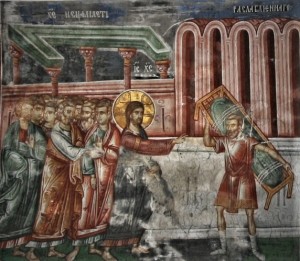Sunday of the Paralytic – Metropolitan of Strumica Nahum
Since Christ was incarnate and identified Himself with us, then there is no reason for despair. He certainly appears in our lives; on countless occasions. It is up to us to recognise the visit.
The God-Man Christ visits us in an iconic way many times, mainly through people that suffer. He Himself has said, “… inasmuch as you did it to one of the least of these My brethren, you did it to Me”. But every meeting with every person in our lives is a gift from God and it is a meeting with Him.
There are also other visits by Him; visits that significantly change our lives. Let us make sure that it is not a permitted illness or misfortune, that is “unwilling visitation” by Him, because of our sins, but let us incite, through a struggle of repentance and obedience, a “willing visitation” – as growing through the stages of spiritual development, transfiguration and deification.
The struggle against every despair and hopelessness, especially in time of sickness, is based, first of all, on true and firm faith, and then on life with hope, which means – without committing sin. Because the cause of most illnesses is sin (John 5: 13–15). This is exemplified by the life of the sick man from the Pool of Bethesda. We see thirty-eight years of patient waiting, in the hope that, eventually, a Man will appear who will lower him into the bath, after the angel has stirred the water.
The Gospel reading of the Sunday of the Paralytic is full of symbolism.
Symbolism of the Holy Baptism: the Pool of Bethesda in which people recovered from any illness with which they were afflicted.
Symbolism of the restoration of the spiritual life of the people: an angel of the Lord stirred the water.
Symbolism of man’s prayerful attitude towards God – which attracts God: When Jesus saw him lying down and as soon as He realised that he had been ill for many years, He turned to him and asked if he wanted to be healed. The sick man symbolises all of us today who are spiritually weak (paralytic).
The most shocking, for me, is the symbolism of the primordial cry of man in search of a real Man and humanity. This is translated into the few words of the Paralytic: “I have no man!” – although we must first restore humanity within ourselves in order to recognise it. As the symbolism of the true obedience, as the Revelation of the meaning of the Spirit of the word – in the word of the law. … They said to him who was cured, “It is the Sabbath, it is not lawful for you to carry your bed.” But he answered them, “He who made me well, said to me, ‘Take up your bed and walk!'” (John5, 9- 11).
I would now dwell on two other symbolisms, the symbolism of the end of the Old Testament and the symbolism of the end of the New Testament. Both symbolisms come down to just a few words: “I have no man.”
Regarding the symbolism of the end of the Old Testament, the whole New Testament speaks to us of the whole of Our Father’s Dispensation of our salvation, but also today’s gospel reading, where the Son of God, Jesus Christ, appears both as the true God and as the true Man, as the God-Man. No such Man had appeared until then; and we crucified Him.
Regarding the symbolism of the end of the New Testament, the Apostle Paul tells us: “In the last days perilous times will come. Because people will become avaricious, proud, blasphemers, ungrateful, unjust, irreconcilable, slanderers, without self-control, disobedient, traitors. More so, lovers of pleasure rather than lovers of God, seemingly pious, but denying the power of God. And from such people turn away!” In other words, there will be no people (men).
The real man, as an image of God who is to become the likeness of God, is love. The words “cooling of love” are synonymous with the words I have no man – true man. That will be the main feature of the last days, the signs which we see even today. Thank God, a real man can still be found; but it also means that the Apocalypse absolutely depends on us, on our repentance or unrepentance; on our humanity or inhumanity…
Lord Jesus Christ, through Theotokos, have mercy on us!
Metropolitan of Strumica Nahum
(22.05.2021 15:56)

